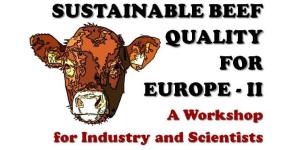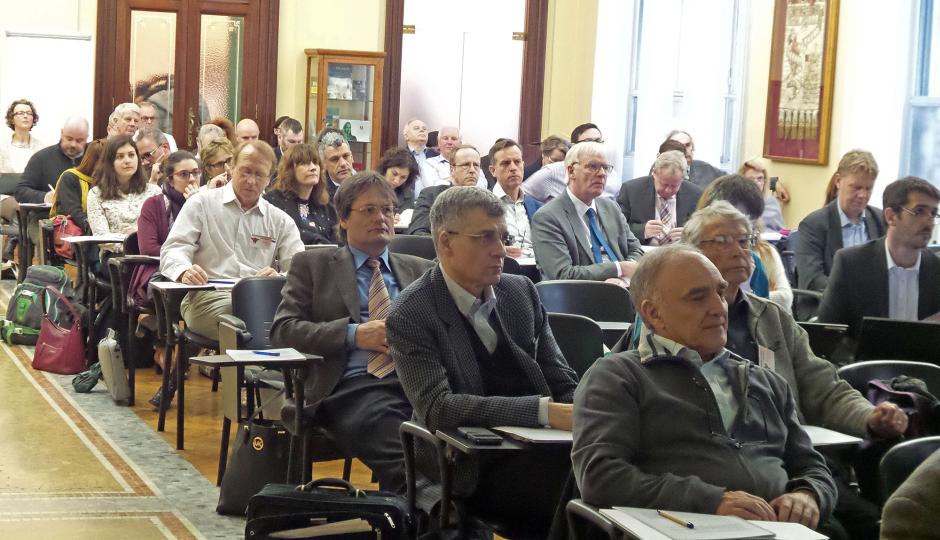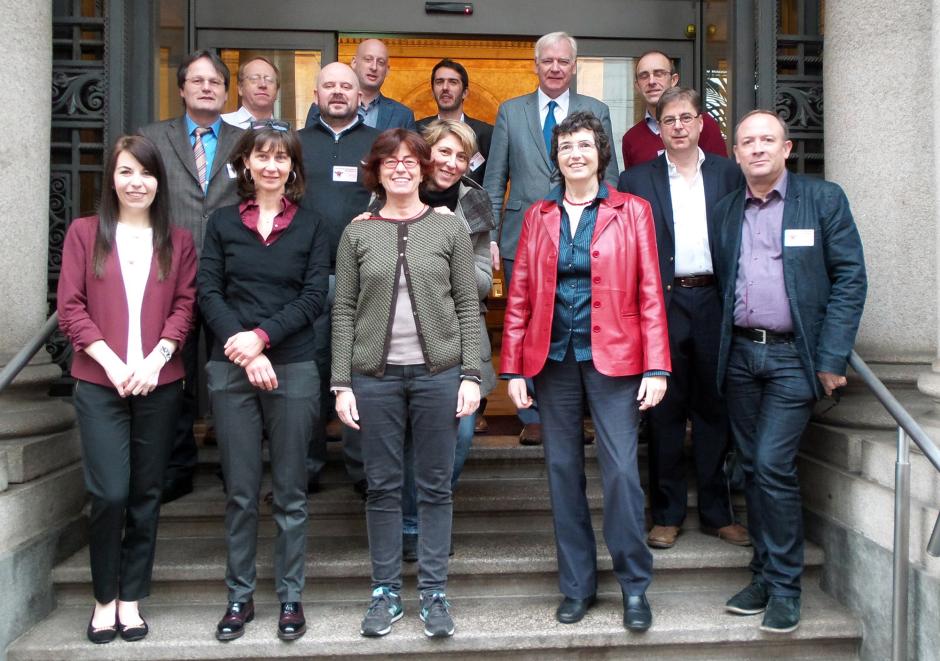Industry and Scientists meet in Milan to Address Beef Questions in AFBI led Workshop
Date published:
More than 80 people from the beef industry and research communities across Europe met in Milan on 1-2 February 2017 for a meeting entitled “Sustainable Beef Quality for Europe–II”, organised by AFBI with the University of Milan, funded by the UK Science and Innovation Network.

Following the success of the first workshop of the same title, held in Milan in October 2015, there was considerable support for a second meeting. The meeting was organised by Linda Farmer of the Agri-Food and Biosciences Institute, Belfast, UK together with the British Embassy in Rome and the University of Milan. It was held at the “Touring Club” of Milan, in Corso Italia.
The goal of the meeting was to strengthen links and exchange knowledge between scientists and industry representatives across Europe on some of the key challenges facing the beef industry. Four sessions of short talks addressed four key topics, while two extended workshops invited delegates to discuss the issues raised and contribute their comments.

The first session, on ‘Beef and Human Health’ was chaired by Antonella Baldi, of University of Milan and considered several topical issues: Kurt Straif (International Agency for Research on Cancer, Lyon, France) presented the outcome of and methods behind the recent WHO report on the impact of red meat on the incidence of human cancer. Stefaan de Smet (University of Ghent, Belgium), extended the topic to discuss the potential mechanisms by which red meat may influence cancer formation and what can be done to mitigate any effect. Leonardo Nanni Costa (University of Bologna, Italy) presented a collaborative study of Italian beef consumption which suggested that the amount of beef consumed may only be a half of that assumed by calculations based on purchased meat. Rainer Roehe (Scotland’s Rural College, Edinburgh, UK) discussed the potential for the genetic improvement of nutritional quality while Aidan Moloney (Teagasc, Ireland) summarised the work that has been conducted to improve the fatty acid and nutrient composition of red meat. The session clearly illustrated the conflicted role of beef in the diet, providing essential nutrients and micronutrients while also posing a potential risk to health.
The workshop in 2015 focused on eating quality and the second session of this workshop provided an ‘Update on Beef Eating Quality’, chaired by Declan Troy (Teagasc, Ireland). Jean-Francois Hocquette (INRA, France) summarised work on combined data from across Europe to obtain more information on factors affecting eating quality and to determine the potential for a combined predictive system designed to meet the needs of the European beef industry. David Farrell (AFBI, Northern Ireland, UK) reviewed recent developments in instrumental prediction of eating quality and other important quality attributes. Rod Polkinghorne (Birkenwood, Australia) illustrated the benefits of a ‘value-based payment system’ that rewards farmers on the basis of the quality of the meat produced, not only on quantity. Jerzy Wierzbicki (Polish Beef Association, Poland) updated the meeting on discussions held under the auspices of United Nations Economic Commission for Europe (UNECE) to agree a common system of terminologies and protocols to describe beef cuts and quality, to facilitate the increasingly global trade in beef.
The conference resumed on the second day with a session on ‘Beef Environment and Welfare’, chaired by Jonathan Birnie of Dunbia, UK. Tim Searchinger travelled from Princeton University, USA, to highlight the challenges facing the beef industry in terms of environmental impact. While Searchinger suggested that projected expansion to meet future population needs could have a very detrimental effect on the climate, Europe has one of the most efficient and least damaging production regimes. Modest growth and more efficient processes, together with a moderation of very high beef consumption in some countries could help to mitigate effects on climate. Dequan Zhang, from the Chinese Academy of Agricultural Sciences, presented the approach used in China to make maximum use of all parts of the animal, including bones and blood, to provide nutritional components of the diet. Ettore Capri (Catholic University of the Sacred Heart, Piacenza, Italy) discussed a project on the “Sustainability of Meat and Cured Meats in Italy” which has considered health, nutrition and sustainability. He pointed out that, when considered on the basis of proportion of a Mediterranean diet, the carbon footprint of meat production is no more than that of fruit and vegetables. Paolo Ferrari (CRPA, Italy) described a project to create an assessment system for animal welfare in Italy.
The fourth session discussed ‘Adding value throughout the supply chain’, and was chaired by Jean-Francois Hocquette (INRA, France). Jonathan Birnie (Dunbia, Northern Ireland, UK) outlined priorities to reduce variation in quality and meet customer needs, especially measurement and processing interventions that are practicable at meat plant speeds. Valeria Vigano (Sealed Air Packaging, Italy) explained how innovations in packaging technologies are changing the way meat is presented to the consumer. Ciara McDonnell (Teagasc, Ireland) described the benefits of new processing technologies while Phil Hadley reported that overall beef quality has improved but suggested that specification and trimming may further reduce dissatisfaction.
In the final session on “Findings and Future”, feedback was provided on the responses to the workshops. Workshop 1, entitled, ‘How can the industry help to ensure that beef has a positive nutritional impact?’ generated 35 comments in total, from industry and researchers. Terence Hagan (AFBI, UK) identified three themes which cropped up most commonly in these responses: “Communication” to clarify the nutritional benefits of beef, “coordination” of the industry in addressing the issues and “Omega-3”, the potential to increase these fatty acids in beef. There were fewer responses for Workshop 2, on ‘How should the industry manage the environmental impact of beef?’, summarised by David Farrell (AFBI, UK). In general, responses highlighted the need to make better use of what is currently available. Industry partners focused on requesting a higher percentage of European grasslands be set aside for beef production. Researchers were more interested in minimising waste and maximizing quality. A proposal for funding to the EU for a Thematic Network to continue to build knowledge exchange across Europe within the beef industry was outlined by the coordinator, Linda Farmer (AFBI, UK). The aim is to address four key challenge areas: “Sustainable beef”, Trusted beef”, “Meeting Consumer Expectations” and creating a “Connected Supply Chain”. The proposal will be submitted within the next two weeks. Declan Troy then summed up the meeting by highlighting five areas of particular interest: the need for careful communication of health messages, the importance of sustainability in all its forms, the need for an international “big data” approach on quality, the importance of knowledge transfer and the research pipeline and the need for more measuring and monitoring methods throughout the food chain. He commended the forum for bringing together a diversity of interests to discuss these topics.
The aim will be to continue the dialogue between all those with an interest in the beef industry across Europe into the future, so that an informed and consolidated approach can be taken to the industry’s challenges.

Notes to editors:
AFBI carries out high-quality technology research and development, statutory, analytical, and diagnostic testing functions for DARD and other Government departments, public bodies and commercial companies.AFBI's Vision is “Scientific excellence in Northern Ireland … serving the world”.All media enquiries to AFBI Press Office.